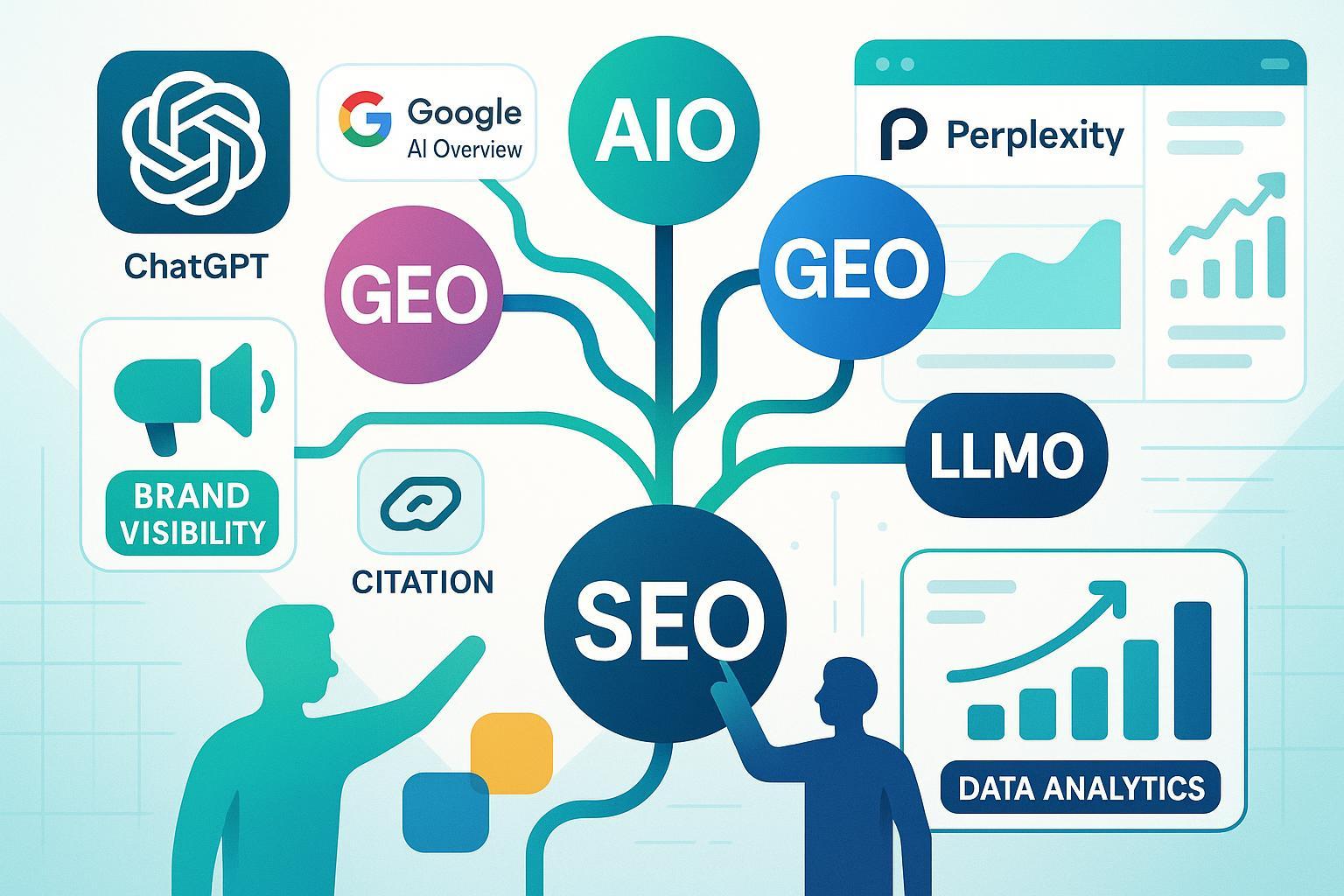Decoding GEO, GSVO, GSO, AIO, LLMO: New AI SEO Terms Explained
Understand the new SEO acronyms—GEO, GSVO, GSO, AIO, LLMO. Discover definitions, AI search trends, and brand monitoring tips for AI-powered SEO.

As search technology surges toward an AI-driven future, marketers and SEO professionals face a wave of new jargon—and a radically shifting landscape. The rise of ChatGPT, Google AI Overview (AIO), and other generative engines demands a fresh optimization playbook. In this article, we’ll decode the five leading-edge acronyms—GEO, GSVO, GSO, AIO, and LLMO—explore their practical meanings, and showcase how platforms like Geneo enable brands to thrive in this evolving ecosystem.
Emerging Acronyms and Their Meanings
Note: These definitions reflect the latest industry thinking, but are not yet standardized. Each term is interpretive and evolving.
GEO: Generative Engine Optimization
Definition: GEO refers to strategies designed to increase a brand’s visibility and citation rate in generative AI-driven answers (e.g., Google Search Generative Experience, ChatGPT, Perplexity). Instead of competing for blue links, GEO optimizes for being selected and referenced in conversational AI outputs source.
GSVO: Generative Search Visibility Optimization (or Google Search, Video, Overview)
Definition: GSVO currently lacks an official, universal meaning. In emerging dialogues, it usually refers to boosting brand presence across Google Search, Video, and specifically AI Overview modules, or as an umbrella for generative search visibility strategy. Its use is still speculative and fluid.
GSO: Generative Search Optimization
Definition: GSO encompasses holistic tactics for optimizing content across any generative AI search engine. The aim: maximize the likelihood of being chosen as a source or cited domain in AI-generated answers—beyond just Google source.
AIO: AI Overview (or AI Optimization)
Definition: AIO most often denotes Google’s “AI Overview”—the AI-generated answer block within search results. It may also reference broader techniques for optimizing specifically to be featured or favorably described in these AI snapshots source.
LLMO: Large Language Model Optimization
Definition: LLMO is the process of tailoring content and digital signals to increase the odds of being referenced or directly surfaced by LLMs like ChatGPT and Perplexity source. It differs from classic SEO by focusing on AI models’ internal selection and citation mechanisms.
Comparison Table: Old vs. New SEO Metrics
| SEO (Traditional) | GEO | GSO | AIO | LLMO | |
|---|---|---|---|---|---|
| Platform | Google/Bing SERP | GenAI engines | GenAI search | Google AI Overview | LLMs (ChatGPT, etc) |
| Goal | Top rank (blue link) | Get cited in answers | Cited/snippet/ref | Featured in AI block | Referenced by LLM |
| Signals | Backlinks, keywords | Authority, clarity | Quality, accuracy | Structured content | Knowledge, signals |
| Tracking | SERP tracking tools | Brand/answer audits | AI citation logs | Inclusion monitoring | LLM output scraping |
The SEO Evolution Path: From Links to Language Models
Traditional SEO focused on optimizing for rank in search engine results pages. With the explosion of generative AI, optimization now targets dynamic answer engines and LLMs. This shift demands:
- Rich, structured information
- Authority signals
- Fact-checked, up-to-date content
- Proactive monitoring of brand mentions across AI outputs
Diagram: SEO to GEO/LLMO Journey
(Imagine a flow from classic SEO to GEO/LLMO with branching toward AIO and cross-platform generative answers)
Applying the New Paradigms: How Geneo Supercharges AI SEO
Platforms like Geneo are leading the charge by bridging the gap between traditional SEO and the new world of generative visibility:
- Cross-Platform Monitoring: Track your brand’s citations and appearances across ChatGPT, Perplexity, Google AI Overview, and more.
- Sentiment Analysis: Instantly understand how your brand is portrayed in AI answers—positive, negative, or neutral.
- Content Optimization Suggestions: Receive actionable AI-driven recommendations to boost your inclusion rate in generative answers.
- Historical Tracking: Analyze changes over time to see how tweaks improve your AI visibility (e.g., from fewer mentions in AIO to top-tier inclusion after optimization).
- Multi-Brand Management: Manage several brands or campaigns in one friendly dashboard.
Example: After using Geneo’s optimization tools, a SaaS company observes a measurable rise in positive mentions within Google’s AI Overview and more frequent citations in ChatGPT-powered summaries.
Geneo Tip: Regularly audit which AI platforms are referencing your brand and compare performance for each acronym—a best practice unique to AI SEO.
Explore case scenarios and see how your brand could benefit at Geneo’s website.
Related Terms & Deeper Dives
- Search Engine Optimization (SEO)
- SERP
- Google AI Overview
- Large Language Models
- Brand Monitoring in AI
Conclusion
The field of AI-powered SEO is dynamic and unsettled. Mastering GEO, GSVO, GSO, AIO, and LLMO provides a head start as search engines and language models redefine digital visibility. With emerging platforms like Geneo, marketers can monitor, optimize, and own their brand narrative across every major AI-driven touchpoint.
Ready to future-proof your brand’s AI presence? Try Geneo for free today.
